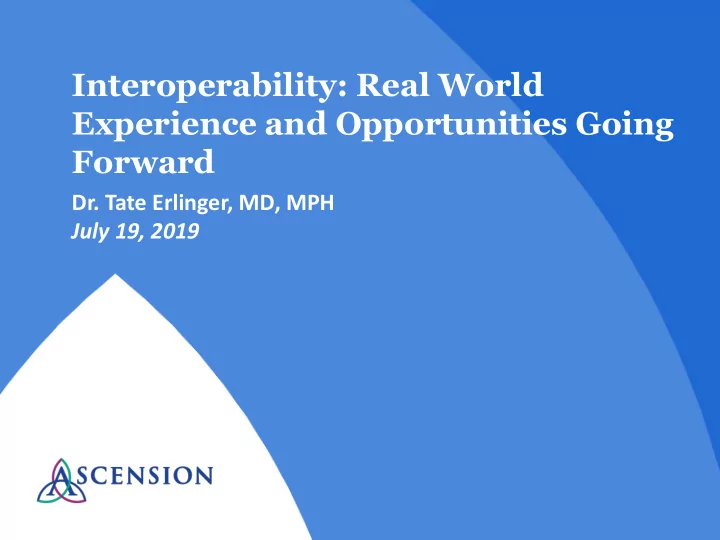

Interoperability: Real World Experience and Opportunities Going Forward Dr. Tate Erlinger, MD, MPH July 19, 2019
Ascension Experience 2
Ascension Experience About Ascension • Ascension, one of the leading non-profit and Catholic health systems in the U.S., operates more than 2,700 sites of care in 21 states and the District of Columbia. • In FY 2018, Ascension provided: • $1.98 billion in care of persons living in poverty and other community benefit programs • 25,164,604 outpatient visits (excluding ER visits) • 12,742,057 physician office visits • 3,160,538 emergency room visits • 1,302,024 clinic visits • 1,648,998 equivalent discharges • 785,255 discharges • 147,044 home health visits • 328,263 observation days • 82,991 births • 27,361 available beds • 156,000 associates** • 34,000 aligned providers** • 151 hospitals** • 50+ senior care facilities** 3 **As of Sept. 2018
Ascension Experience Ascension is a Microcosm of the U.S. • Given its size and scope, Ascension is a microcosm of the U.S. healthcare system. • Ascension has come together as one health system over the course of 20 years. • Multiple different hospital systems and subsidiaries came together or were formed; • Often with different EHR vendors or multiple platforms. • At the same time, Ascension is also on a path to transformation toward integrated, community-based, value-driven care. • A transformational, integrated health system demands implementation of high-functioning, interoperable electronic health systems. • All of the issues related to interoperability that we face reflect what is happening at a national level. 4
Ascension Experience Interoperability is Essential • Interoperability is essential for accomplishing fundamental aspects of integrated, high-value care Provider-to-provider Communications • Coordinated care requires sharing accurate and complete information about a patient’s health status and care. Standardization of Care • How can we create efficiencies, improve quality, and increase value? Measurement and Analysis of Data • What are our benchmarks and are we improving? 5
Ascension Experience Interoperability: Where We Are Today • What it takes to achieve interoperability across a large, complex health system: • Governance Committees : Ascension Clinical Informatics and Analytics Committee (CIAC) Interoperability Subcommittee • Resources : Highly specific, complex modifications to each platform to achieve • Document Transfer • Patient Matching • Facility Identification • Reporting • Event Notifications • Data Monitoring • Data Mapping • Data Management Infrastructure: Extraction and normalization of data takes significant resources because of a lack of interoperability. • Population health requires being able to aggregate and analyze data for large groups of patients. Because this data is sitting in individual systems that lack interoperability, vast resources must be applied in order to extract , normalize and manage the data across myriad software systems inside the healthcare system. 6
Ascension Experience EHR Platform Diversity EHRs INSTANCES FACILITIES/PROVIDERS Acute 8 26 112 Ambulatory 13 30 3750 7
Where We Go From Here 8
Recent Proposed Rules Proceed – But With Caution • Given the importance of achieving interoperability, we are eager to get there. • Collaboration between providers, developers and government is essential. • ONC and CMS proposed rules take some important steps forward, but also raise some concerns. • Even as regulations are finalized, this issue deserves continued attention from Congress, with stakeholder engagement, to ensure complexities are appropriately navigated and unintended consequences recognized and avoided. 9
Interoperability ONC Proposed Rule • Adoption of USCDI • Allows for core data required for exchange to be defined, prioritized, scaled • Information Blocking / Exceptions • Timely information exchange is important • Confusing and difficult to interpret • Possible unintended consequences resulting: comprised security, high costs to providers, unfair labeling of physicians or providers • Conditions and Maintenance of Certification • Communications Restrictions/Gag Clauses • Real-World Testing • Need to ensure existing standard functionalities are readily accessible, easy for consumers to use, and seamlessly available to providers. • Today, certain standards and required functionalities may be technically available through vendors’ platforms, but they often require additional steps or costs for providers to access. • Importance of small and niche vendors • Extremely complicated and extensive requirements / regulations may unintentionally create a situation in which smaller, niche vendors become unwilling or incapable of bearing the costs of compliance. • Opportunities for greater compliance assistance through ONC. 10
Interoperability CMS Proposed Rule • Focused on patient access and control of data • Application Programming Interfaces (APIs) • Proposes to adopt and implement an “openly published” API that permits third-party software applications to retrieve—at the direction of the patient—a significant amount of clinical and payment information. • Privacy and security concerns. • Hospital Conditions of Participation (CoPs) • Would require participating hospitals to send electronic patient event notifications upon a patient’s transition to another provider or care setting. • Requirement as a CoP would create significant resource burden and risk for hospitals. • Patient Matching • Support – but complex. • Incentivizing EHR Use by Long Term Post-Acute Care Facilities (RFI) • Best approach would: (1) facilitate efforts by standards development organizations to develop health IT standards for LTPAC use cases; and (2) reward LTPAC clinicians and facilities who adopt these health IT standards. 11
Recommend
More recommend